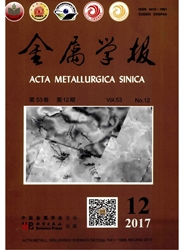

 中文摘要:
中文摘要:
采用磁控溅射技术在Si片(100)和高速钢上制备V-Al-C和V-Al-C-N涂层,利用XRD、XPS、SEM、纳米压痕仪和摩擦磨损试验机对比分析了涂层的相结构、化学组成、表面形貌、断面结构、力学性能以及不同介质中(大气、去离子水和海水)涂层的摩擦学性能。结果表明,V-Al-C涂层呈柱状晶结构生长,晶粒粗大;N的引入阻碍V-Al-C涂层的柱状晶结构生长,结构致密化,晶粒尺寸减小,形成非晶碳包裹纳米晶的纳米复合结构,使硬度从(14±0.48) GPa增加到(24.5±0.8) GPa,韧性得到大幅提高(H/E〉0.1)。大气干摩擦条件下,V-Al-C涂层摩擦系数为0.70,引入N后摩擦系数降为0.42,这主要是由于在摩擦过程中V-Al-C-N涂层生成了具有润滑效果的V2O5,在非晶碳与V2O5耦合润滑作用下,涂层摩擦系数降低了40%;对于同一涂层,在去离子水和海水环境下的摩擦系数较大气干摩擦条件下降低,主要原因为:前者吸附的水分子可形成边界润滑作用。海水环境摩擦时,海水中Mg^2+、Ca^2+生成Mg(OH)2、CaCO3,均可提供进一步润滑效果,摩擦系数最低。3种环境摩擦过程中,30 min后V-Al-C涂层均因严重的磨粒磨损致磨穿而失效,且在腐蚀和磨损的协同作用下,海水环境中的磨损率最高。使用N掺杂制备的V-Al-C-N涂层均显示出良好的抗磨损性能,在干摩擦时磨损率为3.0×10^-16 m^3/(Nm),在海水中为1.4×10^-15 m^3/(Nm)。
 英文摘要:
英文摘要:
The crises of resource shortage have prompted ocean exploitation to spring up all over the world. Some crucial frictional components of marine equipment have to be directly faced with the conjoint action of wear and corrosion. Transition metal nitrides or carbides hard coatings have been widely used to improve tribological performance in various applications. However, the poor toughness, wear and corrosion resistance of coatings cannot meet the harsher marine environment, which needs to obtain multi-functional hard coatings providing complex properties. The nanocomposite structure coatings containing nanocrystalline phase embedded in an amorphous matrix allow tailoring their properties to desired value by designing chemical composition and nanostructure. In this work, V-Al-C and V-Al-C-N coatings were deposited on silicon and high speed steel (HSS) substrates by magnetron sputtering. The crystal microstructure, chemical composition, surface morphology, cross-sectional structure, mechanical property and friction behavior of the coatings under different contact conditions (air, distilled water and artificial seawater) were studied by XRD, XPS, SEM, nano-indentation and ball-on-disc tribometer. The results showed that the V-Al-C coating displayed columnar structure with coarse grain. When the nitrogen was incorporated, the coating structure evolved into nanocomposite structure composed of nanocrystallite and amorphous carbon. The hardness increased from (14±0.48) GPa to (24.5±0.8) GPa, and the toughness was significantly improved (H/E〉0.1). In air condition, the friction coefficient decreased from 0.70 to 0.42, owing to the synergy interaction between V2O5 and amorphous carbon during sliding. The friction coefficients of the both coatings in distilled water and artificial seawater were lower than those in air owing to the boundary lubrication forming lubricative film by absorbed water. The friction coefficient in seawater was lower than those in distilled water, resulting from the formation o
 同期刊论文项目
同期刊论文项目
 同项目期刊论文
同项目期刊论文
 期刊信息
期刊信息
